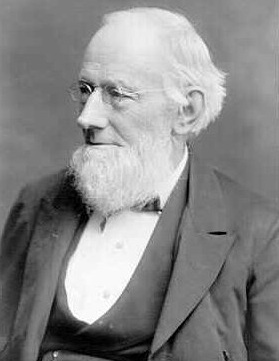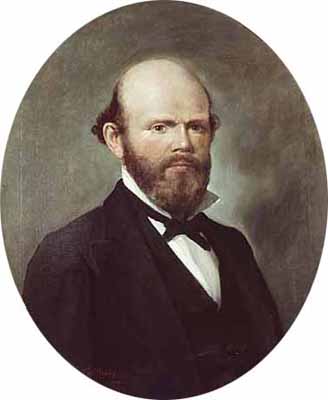<Back to Index>
- Inventor Isaac Pitman, 1813
- 5th Governor of Minnesota William Rainey Marshall, 1825
PAGE SPONSOR

Sir Isaac Pitman (4 January 1813 – 12 January 1897), knighted in 1894, developed the most widely used system of shorthand, known now as Pitman shorthand. He first proposed this in Stenographic Soundhand in 1837. Pitman was a qualified teacher and taught at a private school he founded in Wotton - under - Edge - The British Schhol, Wotton - under - Edge. He was also the vice president of the Vegetarian Society.
He was born in Trowbridge, Wiltshire, in England. One of his cousins was Abraham Laverton. In the 1851 census he appears in Bath aged 38, living with his wife, Mary, aged 58, born in Newark - on - Trent, Nottinghamshire. He married Isabella Masters in 1861, and he appears in the 1871 census, aged 58, with his new wife Isabella, aged 46. In the 1881 census he is listed as Eisak Pitman – given his occupation, the phonetic spelling is interesting. In the 1891 census he is again listed as Isaac, but his birthplace has moved to Bath.
Isaac Pitman was fervently Swedenborgian. Not only did he read The Writings of Emanuel Swedenborg daily, he also devoted much time and energy to educating the world about them. He published and distributed books and tracts by and about Swedenborg.
In 1837 Isaac Pitman first published his system of phonetic shorthand, in a pamphlet entitled Sound - Hand. Among the examples in this pamphlet, were the Psalm 100, the Lord's Prayer, and Swedenborg's Rules of Life.
Pitman was active in the local New Church congregation in
Bath while living on Royal Crescent.
He was one of the founding members, when this congregation
was formed in 1841. He served as president of this society
from 1887 to his death in 1897. His contribution to this
church was honored by the congregation with a stained
glass window depicting the golden cherub in the temple of
wisdom described in Swedenborg's True Christian
Religion No. 508. The window was dedicated on 5
September 1909.
His memorial plaque on the north wall of Bath Abbey reads, "His aims were steadfast, his mind original, his work prodigious, the achievement world wide. His life was ordered in service to God and duty to man."
In about 1837 Pitman discontinued the use of all alcoholic beverages, and in about 1838 he became a vegetarian – both lifelong practices to which, in a famous letter to The Times (London), he attributed his lifelong excellent health and his ability to work long hours.
Pitman founded a company called Sir Isaac Pitman and Sons, which became a one of the world's leading educational publishers and training businesses. The publishing division was bought by rival Pearson Plc in 1985. The training business evolved into two separate businesses: Pitman Training and JHP Training.
Isaac Pitman is the grandfather of Sir James Pitman, who
developed the Initial Teaching Alphabet.
- "Well - arranged time is the surest mark of a well - arranged mind."
- "I have no intention of becoming a shorthand author."

Willian Rainey Marshall (October 17, 1825 – January 8, 1896) was an American politician. He was the fifth Governor of Minnesota from January 8, 1866 to January 9, 1870 and was a member of the Republican party. He served as an officer in the 7th Minnesota Volunteer Infantry Regiment during the American Civil War (1861 – 1865).
He was born in Columbia, Missouri. Marshall first settled in Illinois and Wisconsin, where he mined for lead and surveyed land. He served in the Wisconsin State Assembly in 1848. In 1849 he crossed the St. Croix River to settle in St. Paul, soon home of his fledgling hardware business. He served a term in the first Minnesota territorial legislature, and his reputation grew when he served as chairman of the convention that founded the state's Republican Party.
The one - time banker, dairy farmer, stock - raiser, and newspaper publisher volunteered to fight in both the Civil War and the Dakota War of 1862. He enlisted as a private in the 8th Minnesota and was quickly appointed lieutenant colonel of the 7th Minnesota on August 28, 1862. He fought in many of the battles of the Dakota War being promoted to colonel of his regiment on November 6, 1863. Marshall and his regiment were transferred to Andrew Jackson Smith's command in Missouri and took part in the pursuit of Sterling Price. Smith's command was attached to George H. Thomas' army outside Nashville. When Colonel Sylvester G. Hill was killed the first day of the battle of Nashville, Colonel Marshall took command of Hill's brigade and led it throughout the rest of the battle. He continued in brigade command when transferred to Mobile, Alabama, to take part in the battle of Fort Blakely. Colonel Marshall was brevetted brigadier general of volunteers, dated March 13, 1865.
Marshall won the 1865 and 1867 gubernatorial elections. As governor, he repeatedly urged passage of a black suffrage amendment. After defeating it twice, the legislature finally adopted the amendment and inspired Marshall to declare that the "free young state of Minnesota" is "now altogether free." During William Marshall's administration, his adoptive state experienced a post - Civil War surge of growth and development: its population doubled to 350,000, its railroad mileage quadrupled, and its commercial endeavors flourished.
After leaving office, Marshall remained active in both the private and public sectors as an attorney, banker and as a railroad and land commissioner. He was a partner in a law firm with Jude Kerr and Robertson Howard while residing in St. Paul, but subsequent commercial ventures faltered, as did his health. He moved to California in 1894 and died there two years later.
Marshall County, Minnesota was named after him. He is listed as one of the few politicians to be an adherent of Swedenborgianism.